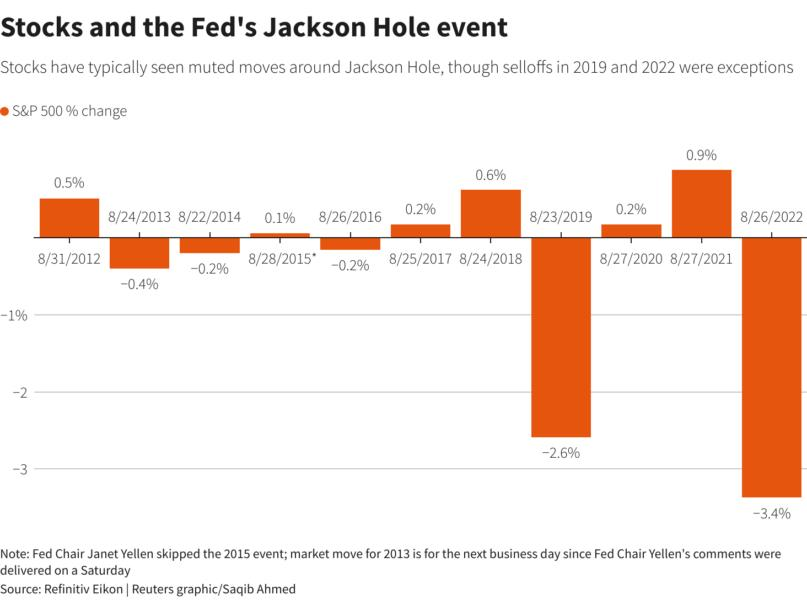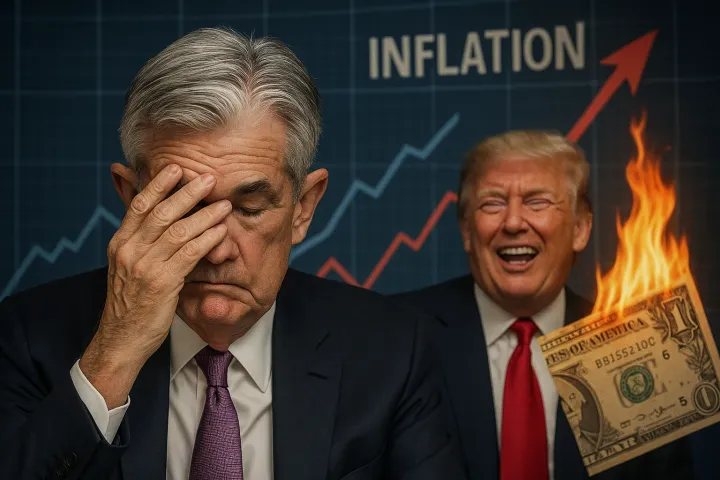PMI, Jackson Hole, Stagflation & BRICS

Some people argue that history is just a sequence of unrelated events, one after the other. Similarly, much of the financial market reporting tends to be a stream of individual events, often linked together in a misleading way.
There's a phrase called "post hoc ergo propter hoc" which refers to the fallacy of assuming that just because one event follows another, the first event must have caused the second. In other words, financial market coverage often makes the mistake of wrongly attributing cause and effect between different market events.
Yet, we see some underlying patterns. The recent suspicious plane crash of mercenary leader Wagner Prigozhin in Russia has even market analysts noting a political pattern. His death in a plane crash might hint at a possible Machiavellian power play.
PMI
Economic data are troubling. UK and European PMI (Purchasing Managers' Index) numbers weren't looking that great. It's a monthly survey taken from companies in various sectors of the economy, like manufacturing and services. Basically, it's a quick snapshot that tells us how a specific part of the economy is doing.
- A PMI score above 50 generally indicates that the sector is growing.
- A score below 50 suggests it's contracting
- A score right at 50 means no change
So we saw really bad PMI numbers on Wednesday. The UK's manufacturing scored 42.5 and services got 48.7. Europe wasn't doing great either, with 43.7 in manufacturing and 48.3 in services, and Germany was even worse. In the U.S., manufacturing was at 47.0 and services were at 51.0. On top of that, there are signs that inflation is rising again, which hints at stagflation.
The latest PMI numbers indicate contraction and signs of inflation, suggesting the possibility of stagflation.
U.S. 2-year bond yields dropped by 8bps to 4.97% and the 10-year yields fell 13 basis points to 4.20%. In the UK, 2-year yields dropped by 17 basis points to 4.97%, and 10-year yields went down 18 basis points to 4.47%.
German 2-year yields also dropped by 13 basis points to 2.96%, and their 10-year yields dropped 12 basis points to 2.51%.
Meanwhile, I contribute this to Nvidia earnings, stocks ended higher on Wednesday, the dollar initially spiked but then slipped back, oil prices fell and then rebounded, and both gold and bitcoin saw a jump which was short-lived.

Jackson hole
The recent data is the last thing central banks wanted to see before their big meeting in The Federal Reserve Jackson Hole meeting. This is basically a get-together where central bankers, finance ministers, economists, and academics from around the world come to talk about the global economy.
This meeting could give us some hints about when and how fast the Federal Reserve will start cutting back on buying assets.
They're probably doubling down on keeping interest high for an extended period of time and framing it as a broader strategy for "structural changes" in the economy. So yeah, they basically pop a few Adderalls and get to the drawing board.
They will probably stick with their "Higher For Longer" strategy, framed as a "Structural Change."
This led to shifts in bond yields, currency rates, and commodity prices. Some stuff doesn't make sense.
There's this misguided idea that "You should be buying bonds if there is or fear stagflation," but investing in bonds during stagflation is a poor choice. Either the central bank hikes interest rates, which won't help, or they keep rates stable, leading to a situation where your money's value erodes.
SPX500% change during Fed's Jackson Hole event

Buying bonds during stagflation
Stagflation is a tricky economic situation where you've got stagnant growth, high unemployment, and rising inflation at the time time. It's like the worst of both worlds.
Okay, here are two scenarios
If the central bank raises rates, usually, central banks may raise rates to fight inflation. In a stagflation scenario, raising rates might not do much good for the economy. Higher interest rates would make borrowing more expensive, potentially slowing down economic activity even more. Now if rates go up, bond prices usually go down. So if you buy bonds, you're looking at a loss. (reminder, 2023 March banking crisis)
Now let's say don't raise rates, in this case, you're stuck with bonds that earn awfully low interest, while inflation eats away your purchasing power (financial repression). You're essentially losing money in real terms, even if the nominal value of your bonds stays the same.
In both cases, you're screwed.
BRICS
Of course! As the BRICS countries (Brazil, Russia, India, China, and South Africa) gathered for a meeting in South Africa, several noteworthy events unfolded. Such as the plane crash of mercenary leader Wagner Prigozhin in Russia.
India accomplished to land a rover on the moon at a cost so low, one could say a cost lower than a Bollywood movie.
/cloudfront-us-east-2.images.arcpublishing.com/reuters/7DXRDD2LJZPUVBG3MEDJUKTJ54.jpg)
Meanwhile, U.S. President Biden canceled a planned trip to Indonesia, a nation aspiring to join the BRICS group, making another instance where Southeast Asia got sidelined in U.S. foreign policy.
The BRICS meeting was characterized by frustration towards the US and its G7 allies for focusing on minor offenses while ignoring their own wrongdoings and macro transgressions.
At the same time, the BRICS countries just had a meeting in South Africa. During this period, Prigozhin, associated with Russia was eliminated, and India managed to land a rover on the moon for less money than what a bad Hollywood film on the subject would cost. Meanwhile, President Biden decided to cancel his forthcoming trip to Indonesia, a country looking to join the BRICS, thereby sidelining the ASEAN region as a priority in U.S. foreign policy once again. In fact, the BRICS nations were pretty unhappy with the U.S. and the G7 countries, feeling that while these nations fixate on minor offenses, they are oblivious to their own significant wrongdoings.
China's President Xi Jinping warned against the world sleepwalking into a new Cold War, maybe it is easier to quote
Right now, changes in the world, in our times, and in history are unfolding in ways like never before, bringing human society to a critical juncture. Should we pursue cooperation and integration, or just succumb to division and confrontation? Should we work together to maintain peace and stability, or just sleepwalk into the abyss of a new Cold War? Should we embrace prosperity, openness, and inclusiveness, or allow hegemonic and bullying acts to throw us into depression? Should we deepen mutual trust through exchanges and mutual learning, or allow hubris and prejudice to blind conscience? The course of history will be shaped by the choices we make.
Source:

,
Interestingly, many other countries are expressing interest in joining BRICS, which, if combined, would have a GDP larger than that of the G7. I may, or may not regret saying this, but BRICS becoming a functional "New World Order" doesn't make sense.
Let's say a ton of countries want to join BRICS. If they all got together, they'd be richer than the G7.
You can't just add up GDPs and its population, to somehow expect everything to work like magic. Nah, I don't think that's not how it works.
Creating a new world order isn't easy, but you know what's more doable? Destroying the existing one.
Let's say if the BRICS countries and their partners start using their own currencies for trade instead of the dollar, it would have far-reaching implications. That change can lead to a breakdown similar to the 1930s when global supply chains and the flow of money between countries fragmented. Such a shift would complicate things further such as payment systems.
Are you a premium member of the newsletter but still didn't join Discord?
(Also article does not end here)
Join Discord to get the full value out of the newsletter. There's no extra cost associated with Discord. It's included. All service ;)
Yes, options data such as dark pools, unusual flow, etc, are also included.



Babe, Zoltan's newest peace is out, wake up!
Zoltan's latest analysis, cheekily titled "Ex Uno Plures" which means "Exit throughout the gift shop" in Latin
Which divides its focus between the Federal Reserve's financial moves and emerging alternatives to the U.S. dollar. However, what's most relevant about the Fed right now is what strategies they'll use to keep funding the Pentagon while interest rates remain high.
Something that might be discussed at the upcoming Jackson Hole meeting.
Meanwhile, Michael Pettis points out that Zoltan's understanding of global financial flows is flawed.
Zoltan could have paid attention to a Republican Party presidential debate where there was a consensus. The U.S. wants to move away from increasing trade deficits and instead focus on a policy that promotes its own industries, sometimes referred to as mercantilism or industrial policy.
ApeX DEX
Before continuing to read this, ByBit has made KYC mandatory as many other exchanges. Why not try out ApeX DEX? You can use your wallet or social account to use the DeX. No gas fees are required for trading & the fast trading experience is like a CEX.
Consider ApeX DEX
Instructions:
https://twitter.com/RNR_0/status/1652360705331347461
For a lifetime fee discount, check the link



